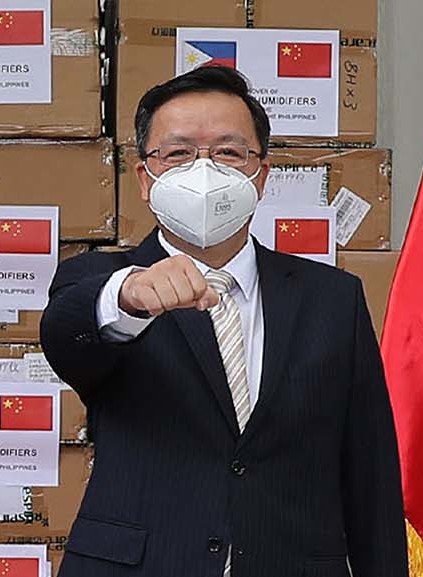by Brian Hioe
語言:
English
Photo Credit: ABOVE THE SKY/WikiCommons/CC BY-SA 4.0
RECENT COMMENTS by China’s ambassador to the Philippines, Huang Xilian, threatened the 150,000 Filipinos living in Taiwan in the event of a Chinese invasion of Taiwan.
Huang’s inflammatory remarks were made in context of warnings by China against the government of the Philippines for allowing the US further access to bases there. Although the Duterte administration played an awkward balancing game between the US and China, with Duterte suggesting favoritism for China at various points, the current presidency under “Bongbong” Marcos Jr. has again tilted back towards strengthening ties with the US to counter the threat of China.
As such, the Philippines recently reemphasized its mutual security treaty with the US. Following China’s live-fire exercises around Taiwan in response to the meeting between Taiwanese President Tsai Ing-wen and US Speaker of the House Kevin McCarthy, the Philippines began its largest-ever joint exercises with the US.
Though the US and the Philippines assert that the drills are not in response to China’s live-fire exercises, it is probable that they were timed for after the Tsai-McCarthy meeting, since it would take time to move material in place for the drills. Likewise, the US was likely expecting China to respond with military threats to the drilling.
This is the first time that representatives of the Chinese government have so publicly threatened residents of other countries currently in Taiwan. However, the governments of Southeast Asian countries with large resident populations in Taiwan are increasingly concerned with the potential outcome of a Chinese invasion and how to evacuate their citizens. The governments of the Philippines and Indonesia have discussed plans on evacuating its citizens in the event of an invasion.
 Huang Xilian. Photo credit: Presidential Communications Operations Office/Public Domain
Huang Xilian. Photo credit: Presidential Communications Operations Office/Public Domain
Ironically, China’s threats are probably mostly bluster. China’s recent military exercises did not seem to be aimed at simulating an all-out invasion, per se, but a blockade. Certainly, foreign residents of Taiwan would be affected by a blockade, yet ironically, other countries in the Asia Pacific’s maritime routes would be affected by the blockade as well. This could potentially precipitate action by these countries aimed at staving off a blockade.
To this extent, China would hope to take Taiwan while minimizing damage to infrastructure. For one, China’s electronics supply chains are reliant on Taiwanese semiconductor manufacturing, as a result of which China would hope to avoid damage to foundries and fabs. But the electronics industry in Taiwan is itself heavily reliant on migrant labor, primarily from southeast Asian countries, for maintaining fab production.
It is to be seen if the representatives of the Chinese government move to threaten citizens of other countries residing in Taiwan. But while China may aim to intimidate, it is also possible that this would lead to blowback from those that do not take kindly to threats.
The Chinese government likely hopes to discourage third countries from becoming involved in a possible conflict over Taiwan. Although the US maintains a network of bases across the Asia Pacific and many Asia Pacific countries are historical client states of the US, its ability to intervene in a Taiwan contingency would likely be limited if it is denied basing access by its allies. Hence why the Chinese government would direct threats at the Philippines government in this way.
To this extent, the Chinese government has tensions with the Philippines over conflicting claims in the South China Sea. Moreover, one notes that joint drills between the US and the Philippines or in maritime domains near the Philippines are increasingly common in the aftermath of Chinese military drills that react to meetings between the Taiwanese president and high-ranking US elected officials.
Other countries with large migrant worker populations in Taiwan, such as Indonesia, Thailand, and Vietnam are less likely to play a strategic role in the event of a conflict with China. While the Thai government is historically close to the US and Vietnam’s government is closer to Thailand, it is less likely that these countries would become embroiled in primarily a maritime conflict over Taiwan. It is to be seen whether the Chinese government continues to make such threats–one also perhaps should not make too much of comments by individual “Wolf Warrior” diplomats as representing a concert stance or posture on the part of the Chinese government.

